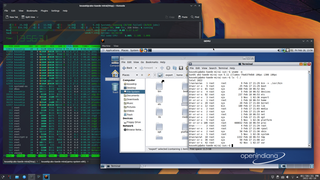
A Java virtual machine (JVM) is a virtual machine that enables a computer to run Java programs as well as programs written in other languages that are also compiled to Java bytecode. The JVM is detailed by a specification that formally describes what is required in a JVM implementation. Having a specification ensures interoperability of Java programs across different implementations so that program authors using the Java Development Kit (JDK) need not worry about idiosyncrasies of the underlying hardware platform.

PHP is a general-purpose scripting language geared towards web development. It was originally created by Danish-Canadian programmer Rasmus Lerdorf in 1993 and released in 1995. The PHP reference implementation is now produced by the PHP Group. PHP was originally an abbreviation of Personal Home Page, but it now stands for the recursive initialism PHP: Hypertext Preprocessor.
OCaml is a general-purpose, high-level, multi-paradigm programming language which extends the Caml dialect of ML with object-oriented features. OCaml was created in 1996 by Xavier Leroy, Jérôme Vouillon, Damien Doligez, Didier Rémy, Ascánder Suárez, and others.

In computer science, an interpreter is a computer program that directly executes instructions written in a programming or scripting language, without requiring them previously to have been compiled into a machine language program. An interpreter generally uses one of the following strategies for program execution:
- Parse the source code and perform its behavior directly;
- Translate source code into some efficient intermediate representation or object code and immediately execute that;
- Explicitly execute stored precompiled bytecode made by a compiler and matched with the interpreter Virtual Machine.
Parrot is a discontinued register-based process virtual machine designed to run dynamic languages efficiently. It is possible to compile Parrot assembly language and Parrot intermediate representation to Parrot bytecode and execute it. Parrot is free and open-source software.
Bytecode is a form of instruction set designed for efficient execution by a software interpreter. Unlike human-readable source code, bytecodes are compact numeric codes, constants, and references that encode the result of compiler parsing and performing semantic analysis of things like type, scope, and nesting depths of program objects.
In computing, just-in-time (JIT) compilation is compilation during execution of a program rather than before execution. This may consist of source code translation but is more commonly bytecode translation to machine code, which is then executed directly. A system implementing a JIT compiler typically continuously analyses the code being executed and identifies parts of the code where the speedup gained from compilation or recompilation would outweigh the overhead of compiling that code.

QEMU is a free and open-source emulator. It emulates a computer's processor through dynamic binary translation and provides a set of different hardware and device models for the machine, enabling it to run a variety of guest operating systems. It can interoperate with Kernel-based Virtual Machine (KVM) to run virtual machines at near-native speed. QEMU can also do emulation for user-level processes, allowing applications compiled for one architecture to run on another.
In computer science, ahead-of-time compilation is the act of compiling an (often) higher-level programming language into an (often) lower-level language before execution of a program, usually at build-time, to reduce the amount of work needed to be performed at run time.
The Berkeley Packet Filter (BPF) is a technology used in certain computer operating systems for programs that need to, among other things, analyze network traffic. It provides a raw interface to data link layers, permitting raw link-layer packets to be sent and received. In addition, if the driver for the network interface supports promiscuous mode, it allows the interface to be put into that mode so that all packets on the network can be received, even those destined to other hosts.

V8 is a free and open-source JavaScript and WebAssembly engine developed by the Chromium Project for Chromium and Google Chrome web browsers. The project's creator is Lars Bak. The first version of the V8 engine was released at the same time as the first version of Chrome: 2 September 2008. It has also been used on the server side, for example in Couchbase, Deno and Node.js.
HipHop for PHP (HPHPc) is a discontinued PHP transpiler created by Facebook. By using HPHPc as a source-to-source compiler, PHP code is translated into C++, compiled into a binary and run as an executable, as opposed to the PHP's usual execution path of PHP code being transformed into opcodes and interpreted. HPHPc consists mainly of C++, C and PHP source codes, and it is free and open-source software distributed under the PHP License.

GraalVM is a Java Development Kit (JDK), written in Java. The open-source distribution of GraalVM is based on OpenJDK, and the enterprise distribution is based on Oracle JDK. As well as just-in-time (JIT) compilation, GraalVM can compile a Java application ahead-of-time so that it starts instantly, provides peak performance with no warmup, and uses fewer resources. It provides additional programming languages and execution modes. The first production-ready release, GraalVM 19.0, was distributed in May 2019. The most recent release is GraalVM for JDK 21, made available in September 2023.
XHP is an augmentation of PHP and Hack developed at Meta to allow XML syntax for the purpose of creating custom and reusable HTML elements. It is available as an open-source software GitHub project and as a Homebrew module for PHP 5.3, 5.4, and 5.5. Meta also developed a similar augmentation for JavaScript, named JSX.
Hack is a programming language for the HipHop Virtual Machine (HHVM), created by Meta as a dialect of PHP. The language implementation is open-source, licensed under the MIT License.

WebAssembly defines a portable binary-code format and a corresponding text format for executable programs as well as software interfaces for facilitating interactions between such programs and their host environment.

PeachPie is an open-source PHP language compiler and runtime for the .NET Framework and .NET. It is built on top of the Microsoft Roslyn compiler platform and is based on the first-generation Phalanger project. PeachPie compiles source code written in PHP to CIL byte-code. PeachPie takes advantage of the JIT compiler component of the .NET Framework in order to handle the beginning of the compilation process. Its purpose is not to generate or optimize native code, but rather to compile PHP scripts into .NET assemblies containing CIL code and meta-data. In July 2017, the project became a member of the .NET Foundation.







